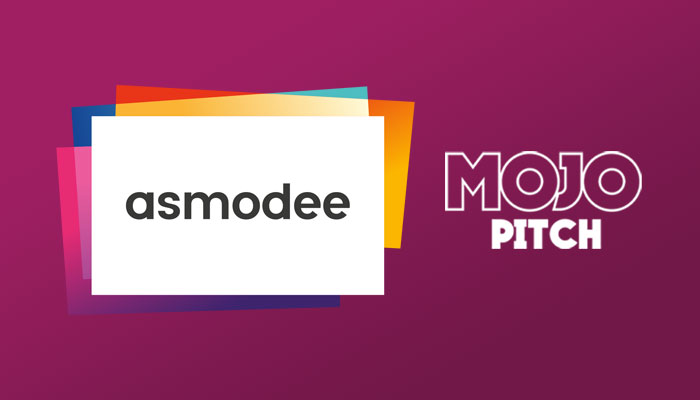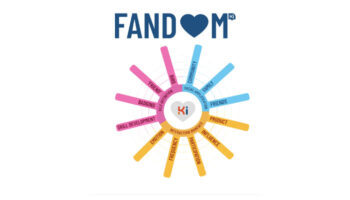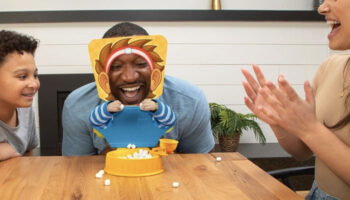Bezzerwizzer, MixLore and Zygomatic: Jonas Resting-Jeppesen on pitching to Asmodee

Alright… First things first: inventors arrive in the room to pitch to you, sir… How do they pronounce your name?!
It’s Jonas, with a soft J, like a Y…
Yo-nas?
Perfect!
Great! And your middle name is less likely to come up at the pitch – but out of insatiable curiosity… Resting? You must have heard all the jokes!
Ha! Well. I didn’t realise that Resting meant what resting meant in English before I went to the US. As always, the customs officer had a very serious conversation with me, but then she had this slight smile… As I turned to leave, she was like, “You take it easy now!”
Ha! But you didn’t get that at the time?
No, I was wondering why she was smiling at me!
Ha! Funny! Of course, US customs people are very thorough, so – you know… Worth saying here that we have the utmost respect for them! Alright, so… Thanks for joining me. You’re doing the call with me now as Asmodee, but there are three studios in the room on the day. Tell me about that…
The studios that are in the room are Bezzerwizzer, MixLore and Zygomatic.
And in terms of the kind of games you’re looking for, we have your wish list, of course… What, though, are you after – broadly speaking?
Broadly speaking, social-play type games. Basically, the not-so hobby part of the business: adult or family minded mass-market potential. That doesn’t necessarily mean straight to mass, but mass-market potential… We’d like it to be able to grow to mass.
I heard the word ‘adult’ in there – I’m sure it wouldn’t really cause confusion, but just to clarify: you don’t mean rude adult games; after-dark games… You mean party games for adults?
Yes exactly. Games for adults, not adult games.
Great, thank you. And in your experience, Jonas, are there any common mistakes that inventors should avoid with you?
There are. I think one big one is to spend too much time showing all the details of a game. We’re looking for things that we want to be able to go to mass, so we very much look for the potential of a game – the core concept. What makes this game unique? Do we believe we can sell it? Do we believe we can put it across just on the front and back of the box? Can I make one-page rules? Is it easy to set up and breakdown? Does it have simple components that we can actually produce for that price point?

We’re looking at all those things and are actually quite fast at interpreting that. Similarly, we might be asking how we see this game translating into something… So it’s really not necessary that we get all the details of the rules just as consumers wouldn’t get that in the store. We need to see that the core of the concept is fun and simple and intuitive.
I think you and I are very much on the same page, Jonas. At point of purchase, a customer doesn’t buy a game based on whether or not they can use a bonus card worth two rubies… And nor do you! You want the gist: the tone and the headline.
Exactly. And how it works out from there is, I think, a bit different from studio to studio and how much they’re willing to develop a concept. Then, after a minute- or two-minute introduction and an overview of that core concept, we would like a physical one-pager. Now, if someone says, “We can send something” or “We can email the slides after”, that’s okay… But really, I like having a physical one-pager that we can make notes on and take away. We love that! And not a huge deck of all the games… One sheet so that we can say to ourselves, “This was the one we liked.”
You raise two excellent points there Jonas. First, you personally prefer a sell sheet not to be laminated? Because you might want to write on them?
Right – although one distinction I’d make is that I prefer one-pagers, not sell sheets. To me, the difference is that a sell sheet very much concentrates on the business case of the game.
Oh! I think you’re the first person I’ve heard make that distinction. To you, a one-pager is like a sell sheet, you’re saying? But it doesn’t present any business information?
Yes. I mean, it’s fine if it has some numbers or some thoughts on that, but to me, what matters is the summary of the core: what was it, what are the most important things about this game? An outline of how it’s played and where the fun is so that I can later run through things with the team and say, “We saw this, and it had an engaging core…” You know? “This one seems like it’s expandable to a whole brand line.”

Interesting. And second, then, I know there are some people that say, “sell sheets – one-pagers – are old fashioned!” They won’t touch them. But you really like them… Over and above a sizzle, even?
Yes, I’d much rather see a few components and how something really plays than a video or anything else. If someone can present in a way that more or less simulates the real-play situation, then so much the better. I like it when someone can say, in effect: “Let me show you a game!”, then put it on the table and explain it in two minutes. That way, I know grandma can do the same with the grandchildren. Now, in some cases a video can do that just fine, but often just showing that core play in a physical way is better than a video.
Great! I’m so glad we’re having this conversation, because a lot of inventors will be thinking sizzle first! And I think you’re among a vanishingly rare breed that doesn’t want that!
Is that right?
Yes, but that’s not to imply criticism. I’m calling attention to it so that you and the inventors bring out the best in each other…
Got it. I should add that if it’s remote pitching, if it’s virtual, then that’s different!?
Well, on that: is there any advice that specifically pertains to online pitching?
I think my view is pretty much the same as it is for the live. The faster you can show the core idea the better. How does the game go? What is a turn? If the game has turns! What’s the unique thing? Now obviously, you can’t pass me a card to play for real online… And a video here might be an easier way for me to see how many components there are and how the interaction goes.
Perfect. I’m just thinking about any inventors that are sizzle dependent – for want of a better description! Because the tool is not the goal… So they might need to ask themselves what it is that they want to communicate in a sizzle… Park that! Then ask: how do I communicate that live? Alright… And is there any other advice that you’d give inventors?
I think it’s worth saying that – because, with us, there are three studios in the room – we do need a little time on our side. With every game, we just have to look at each other, take a moment and say, “Do you want to take another look?” Because it’s not just one person saying, “No thank you.”
Ha! Or, as the case may be, three people saying “Yes please!”
Yes! Ha! You do get that once in a while. But, yes, I think that need for time on our side is something to be aware of. But, to me, that’s made up for by the fact that we’re only interested in games that can be pitched fast. There are some other tendencies that we are looking very carefully at, though. We call them universal card games…Like a card game that can be brought out in any market and be universally understood. Like Uno, for example, Dobble, The Mind.

Also, something that we sometimes see is a game that has a unique idea at its core… Something super interesting but maybe it’s only a small core that’s super unique. Inventors sometimes have that, but they’ve built a bigger game around it. When this happens, we have to strip away the larger part.
Right. And you sort of touched on it a bit earlier: you’re also looking for a brand you can build up? Junior versions, adult versions – or, more precisely, versions for adults!
Yes. And that’s something that I think were doing more at Bezzerwizzer than the other two studios… Looking at creating a brand line instead of just one-off games, or just standalone games.
Great. That all sounds excellent, thank you! And to wrap this up, Jonas, how did you get into the industry?
Totally random! As a graphic designer, I was hired on project finishing an already done game. But when it came to the gameplay, I couldn’t help involving myself in all sorts of discussions! Because I’d had a little experience working at a board game store in Canada. I knew about Catan; I’d sold a bunch of copies. The interest was there… Ha! So after that initial experience, I slowly became more and more expert in that field. And now I’m head of games at the Bezzerwizzer.
Amazing! I love that; what a great origin story. Thank you for joining us, Jonas. Looking forward to seeing you soon.
–
To stay in the loop with the latest news, interviews and features from the world of toy and game design, sign up to our weekly newsletter here






















